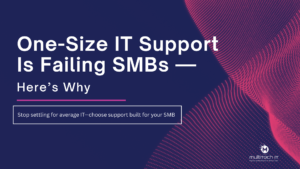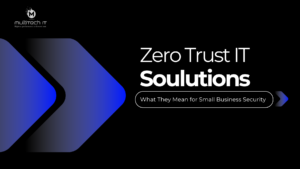Could you ever imagine how crucial the role of technology in a dental clinic? What you observe in the clinic- dental chairs, X-ray machines, and patient records, right?
The truth is that its role is beyond these things. Modern dental practices, these days, depend on smart systems. This is simply because AI is there to manage modern dental practices effectively, which cover everything from handling IT systems to managing patient records, imaging, appointment scheduling, billing, and even treatment planning. However, saying is easier. But indeed, introducing technology in dental practices involves serious challenges that are often overlooked.
So, let’s start spotlighting them. A recent survey by the Americal Dental Association (ADA) reveals that over 75% of dental practices now leverage digital systems for patient management (a report). It means that everything, from digital X-rays to cloud-based appointment management, relates to technology. Here also, the gist is that with great responsibility comes great risks.
Common Challenges with IT in Dental Clinics
Let’s throw some light on some risks that are common in digital dental clinic practices.
1. Cybersecurity Threats
Cybersecurity-this term creates fear. It’s the most overlook threat in dental clinics. Certainly, the sensitive information of patients’ health like medical histories, treatment details, insurance information, and contact details are stored there.
Despite the fact, several dental clinics are there that ignore how to tackle cybersecurity risks. In that ignorance, they continue to use outdated software, weak passwords, and delay system updates (which should be a regular practice). It leaves them exposed to malicious cyberattacks like ransomware, which is the unethical case of vulnerability where hackers lock up your data and demand a ransom to unlock it.
Many articles unveiled shocking incidents where more than 600 healthcare organizations faced ransomware attacks worldwide. So, it’s a threat that you should not ignore.
2. Data Management Challenges
Those who handle patients’ data, understand the pain. It’s not just about storing names and phone numbers of patients. A massive set of records of digital X-rays, treatment plans, billing records, and consent forms is there to manage. So, it’s not a cakewalk to manage it. These records need proper categorization. Also, these records must be retrievable, especially during consultations or appointments.
Certainly, multiple dental clinics are not ready for it. They still use mismanaged spreadsheets or paper files, which causes inefficiencies and errors. That’s why over 40% of medical errors occur because of wrong and incomplete records of patients.
In this case, a proper IT system appears a lifesaver for dentists. It enables structured databases like MySQL or Microsoft SQL server with backups, easy retrieval, and strong access controls.
3. Outdated Hardware & Software
The fast-evolving tech world is transforming the corporate world into a digital ecosystem, where running with outdated hardware or software is impossible. They are risky because they may breakdown at any time. But still, many dental practices don’t think of this side because of cost concerns.
Old systems or software become obsolete, slow, and incompatible with new devices over time. This gap can be filled by using third-party integrations. For instance, paper-based reports can be converted into digitized data by using a 3D printing setup. This approach eliminates the possibility of inefficiency and lacking patients’ care because of unorganized reports.
4. Tech Support for Dental Practices
Dentists may not be IT experts. This is where dedicated IT support services for dental clinics come into play. For those who think it’s a luxury to afford an expert tech support engineer, it’s not. Delegating this responsibility to a professional IT support team helps in getting all data in place in a sorted way. Also, the data management systems continue to update without undergoing any technical glitches like troubled network or non-compliance with IT governance regulations.
Let’s consider a case where a dentist has maintained digital X-rays and reports. But suddenly, the software crashes when he tries to access a patient’s digital X-ray. The cases like this require immediate tech support without delays. An IT support professional can resolve it within minutes, preventing any critical condition.
In addition to it, tech support experts frequently follow data backup protocols so any disaster like data loss can be avoided in the event of system failure or malicious attempts. Alongside, they keenly monitor the smooth sailing of network and detect hurdles if there appears any before causing any loss or damage.
5. Integration Issues
Another challenge that must be navigated smartly is related to integrating diverse dental technology systems. These systems range from digital imaging devices, billing software, and patient management systems to third-party application. Their seamless integrity lets the data smoothly transferred. This practice reduces the risk of human errors.
Hiring an expert IT support company or professional enables dental clinics to develop custom apps or middleware so all systems in the clinic can be connected. This is the proven method of automatic data flow, timesaving, and maintaining accurate data.
6. Regulatory Framework for Clinical Data
Dental practices also create a tonne of patients’ data, which must be regulated under HIPAA in the U.S., DPDP Act in India, or privacy policies. These regulatory frameworks mandate clinics to strictly follow data privacy and security standards. In case of non-compliance with HIPAA, the fine up to $50K per violable can be levied.
Many dental practitioners are ignorant of this fact. It results in ignoring legal responsibilities, which ends up in penalty. With the support of an IT support team, implementing security policies, training staff on how to manage data effectively, and following ongoing changes in regulations is no big deal.
Conclusion
It’s not clear that the future of dental practice is more sorted and digitally advanced. It’s going to be smarter, more secure, and efficient practice in an efficient IT infrastructure. Certainly, the role of proper tech support cannot be ignored in this case. Dental clinics often face risks like hacking attempts, inefficiency due to unavailability of proper data in time, regulatory penalties, and frustrated patients. The best solution to address these problems is to embrace a data-driven, and technology-backed approach. This shift is the need of the hour.








